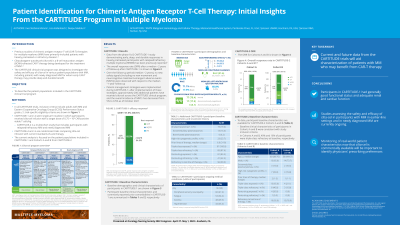Back

Industry Encore Posters
JL1024E: Patient Identification for Chimeric Antigen Receptor T-Cell Therapy: Initial Insights From the CARTITUDE Program in Multiple Myeloma
Saturday, October 22, 2022
10:00 AM – 11:00 AM ET

- JC
Poster Presenter(s)
Chimeric antigen receptor T-cell (CAR‑T) therapies for multiple myeloma (MM) have been predominantly investigated in patients with heavily pretreated or refractory disease. The CARTITUDE clinical trial program was designed to investigate the safety and efficacy of ciltacabtagene autoleucel (cilta-cel) in MM in patients with varying prior treatment histories and in newly diagnosed MM where CAR-T therapy may provide deep and durable clinical benefit. This analysis aims to describe patient populations included in the CARTITUDE studies.
Inclusion criteria for all CARTITUDE trials include adults with MM and Eastern Cooperative Oncology Group (ECOG) Performance Status grade ≤1. Trial-specific eligibility criteria are described in the Figure. In the single-arm studies CARTITUDE-1 and CARTITUDE-2, participants received cilta‑cel infusion with a target dose of 0.75x106 CAR‑positive viable T cells/kg. CARTITUDE-4 and CARTITUDE-5 are randomized trials comparing cilta-cel infusion with current standard-of-care therapy.
CARTITUDE-1 has completed enrollment, and efficacy data including a high response rate have been reported.1 In CARTITUDE-1, 97 participants (median [range] age, 61 [43-78] y) received cilta-cel. Per eligibility criteria, no patients received prior CAR-T or B-cell maturation antigen–targeted therapy. At baseline, 39 (40.2%), 54 (55.7%), and 4 (4.1%) participants had ECOG scores of 0, 1, or 2, respectively (all participants met the inclusion criteria of ECOG score ≤1 at screening). At least 1 ongoing comorbidity at screening was reported in 96 (99%) participants, the most common being peripheral sensory neuropathy (n=60, 61.9%), fatigue (n=53, 54.6%), anemia (n=48, 49.5%), and hypertension (n=44, 45.4%). Mean (standard deviation) creatinine clearance at baseline was 94.2 (31.6) mL/min/1.73m2. Overall interpretations of 12-lead electrocardiogram/multiple-gated acquisition results at screening were normal in 77 (79.4%) participants, abnormal but clinically insignificant in 17 (17.5%) participants, and abnormal with clinical significance in 3 (3.1%) participants. The mean (standard deviation) left ventricular ejection fraction was 60.8% (5.0%).
In conclusion, current and future data from the CARTITUDE trials will aid characterization of patients with MM who may benefit from CAR-T therapy. Participants in CARTITUDE-1 had generally good functional status and adequate renal and cardiac function. Monitoring of real-world patient characteristics once cilta-cel is commercially available will be important to identify physicians’ prescribing preferences.
1. Martin et al. Presented at the 63rd American Society of Hematology Meeting; December 11‑14, 2021; Atlanta, GA/Virtual.
Inclusion criteria for all CARTITUDE trials include adults with MM and Eastern Cooperative Oncology Group (ECOG) Performance Status grade ≤1. Trial-specific eligibility criteria are described in the Figure. In the single-arm studies CARTITUDE-1 and CARTITUDE-2, participants received cilta‑cel infusion with a target dose of 0.75x106 CAR‑positive viable T cells/kg. CARTITUDE-4 and CARTITUDE-5 are randomized trials comparing cilta-cel infusion with current standard-of-care therapy.
CARTITUDE-1 has completed enrollment, and efficacy data including a high response rate have been reported.1 In CARTITUDE-1, 97 participants (median [range] age, 61 [43-78] y) received cilta-cel. Per eligibility criteria, no patients received prior CAR-T or B-cell maturation antigen–targeted therapy. At baseline, 39 (40.2%), 54 (55.7%), and 4 (4.1%) participants had ECOG scores of 0, 1, or 2, respectively (all participants met the inclusion criteria of ECOG score ≤1 at screening). At least 1 ongoing comorbidity at screening was reported in 96 (99%) participants, the most common being peripheral sensory neuropathy (n=60, 61.9%), fatigue (n=53, 54.6%), anemia (n=48, 49.5%), and hypertension (n=44, 45.4%). Mean (standard deviation) creatinine clearance at baseline was 94.2 (31.6) mL/min/1.73m2. Overall interpretations of 12-lead electrocardiogram/multiple-gated acquisition results at screening were normal in 77 (79.4%) participants, abnormal but clinically insignificant in 17 (17.5%) participants, and abnormal with clinical significance in 3 (3.1%) participants. The mean (standard deviation) left ventricular ejection fraction was 60.8% (5.0%).
In conclusion, current and future data from the CARTITUDE trials will aid characterization of patients with MM who may benefit from CAR-T therapy. Participants in CARTITUDE-1 had generally good functional status and adequate renal and cardiac function. Monitoring of real-world patient characteristics once cilta-cel is commercially available will be important to identify physicians’ prescribing preferences.
1. Martin et al. Presented at the 63rd American Society of Hematology Meeting; December 11‑14, 2021; Atlanta, GA/Virtual.

